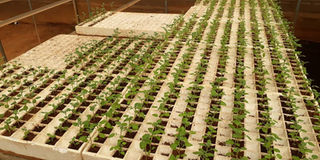Rooted apical cuttings hold great promise for Ugandan potato

Production of RACs in the screenhouse. All photos by Pieter Wauters.
Potato, commonly known as Irish Potato, is a key food and cash crop in Uganda. Its national production has grown over time to respond to increasing demand and consumption. This increase in production is mainly obtained by expanding the land cultivated rather than by increasing the productivity. Currently, Ugandan potato farmers harvest on average 3-12 tonnes per hectare (t/ha), when they could realistically achieve 20-30 t/ha.

RACs planted in seed beds for further multiplication. All photos by Pieter Wauters.
The main reason for this underproduction is that potato farmers generally recycle their own seed or use seed from other farmers usually obtained through informal exchanges or on the open market. Most of the time, this seed is infected with seed-borne pathogens.
To improve farmers’ access to high-quality seed of desired varieties in a timelier manner, and at affordable prices, decentralized seed multiplication has been promoted in Uganda for more than a decade. Decentralized seed multipliers are based in potato growing communities and use early generation seed (mostly basic seed) as starter material for onward field multiplication and bulking.

Seed plot with vigorous potato plants.
However, they must deal constantly with the scarcity of disease-free basic seed. Currently, disease-free basic seed is mainly produced by Kachwekano Zonal Agricultural Research and Development Institute (KaZARDI) in Kabale, southwestern Uganda; Buginyanya Zonal Agricultural Research and Development Institute (BugiZARDI) in Bulambuli, eastern Uganda; and some small-scale farmer seed businesses managing screenhouses in the Kigezi and Mt. Elgon sub-regions.
To complement current seed potato production systems in Uganda, the International Potato Center (CIP), with financial support from the Gesellschaft für Internationale Zusammenarbeit (GIZ) GmbH and the CGIAR Research Program on Roots, Tubers and Bananas, is collaborating with its public and private partners to promote the production and field multiplication of rooted apical cuttings (RACs) in the southwestern districts of Kabale, Kanungu, Rubanda and Kisoro and the eastern districts of Mbale, Kapchorwa and Kween in Uganda.

Seed multiplier harvesting
RACs are like vegetable seedlings. They are produced in screenhouses from in-vitro plantlets by vegetative propagation and transplanted in the field by seed multipliers where they produce each 8-15+ tubers, which are further multiplied for another two to three seasons. These quality seed tubers are then sold to farmers to produce table potatoes for consumption by their household or to be sold on the market.
This is the business of seed production. However, potato farmers can also plant RACs for on-farm seed production and conservation.
Due to their high productivity, RACs have the potential to make larger volumes of quality seed available to potato farmers. This will result in higher yields and incomes for farmers. RACs also reduce the time needed for commercial seed production, increase seed production efficiency, and make newly released varieties more rapidly available. Because of the high demand for quality seed, RACs offer a prime business opportunity for private firms.
RACs are currently produced by KaZARDI, BugiZARDI, Agromax Ltd. (in Kampala) and by five small-scale farmer screenhouse managers in the districts of Kabale, Rubanda, Kisoro and Kween.

High yield obtained from one RAC.
Prices range from Shs400 to Shs1,000 per cutting and they are available for eight varieties: Victoria, Kachpot 1, Kachpot 2, Naropot 1, Naropot 2, Naropot 3, Rwangume and Kinigi. Fifty-six seed multipliers in southwestern and eastern Uganda have also been trained to multiply these cuttings into high-quality seed for sale.
RACs have the potential to greatly expand the supply of quality seed potato, which can double the yields of smallholder farmers who plant them under current conditions. This appropriate technology is poised to contribute significantly to the yields and incomes of smallholder potato farmers in Uganda and beyond.
By Pieter Wauters ([email protected]) and Monica L. Parker ([email protected])
To learn more about CIP visit us at www.cipotato.org
This story is sponsored by International Potato Center


